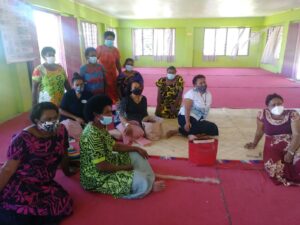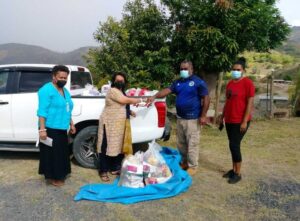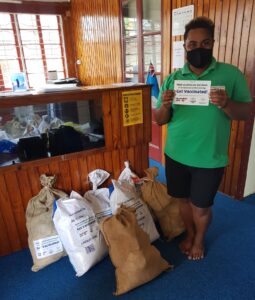Shrinking spaces for rural women a concern for PCP
November 25, 2021
By Erica Lee and Devina Devi
 The easing of COVID-19 related restrictions by the Fijian Government in October 2021 was a move welcomed by the Pacific Centre for Peacebuilding (PCP) who believe that the six months of restrictions had taken its toll on Fijians, especially on rural women.
The easing of COVID-19 related restrictions by the Fijian Government in October 2021 was a move welcomed by the Pacific Centre for Peacebuilding (PCP) who believe that the six months of restrictions had taken its toll on Fijians, especially on rural women.
Through its work in restorative justice and conflict resolution, PCP works with many rural communities and informal settlements to reduce, prevent and transform violence and conflict and to build social cohesion.
“Women’s spaces shrunk dramatically between April – October this year. Women were largely confined to their homes with extended care duties and no safe place to discuss some of the challenges they were facing,” said Florence Swamy, Executive Director of PCP.
PCP highlighted that places of worship such churches and temples which Indo-Fijian women in particular go to or women’s groups were some of the few safe spaces that women could freely access (without interference from husbands or other male relatives) but this was also not available given restrictions on gatherings.
“In their churches and temples, women are able to access critical support and get help especially in situations of domestic violence or just having a peaceful space for rest and break for themselves. The restrictions meant they could not even leave their home or engage with others for help or to share how they were feeling,” added Mrs. Samy.
As a peacebuilding and conciliation service provider, PCP was concerned that these shrinking spaces could result in the loss of some freedoms that women
“In some instances, we found women were unable to have any form of contact outside of their own homes. They were restricted from using the only mobile phone in their household because it was being used by their husbands, or was being used by someone on the other side of containment zones, network issues, unavailability of data so they could remain in contact.”
Humanitarian response – a string of hope
 With the shrinking spaces in mind, PCP explored ways to continue their engagement with and support communities impacted by the pandemic. Through the provision of food rations, PCP was able to keep many doors and lines of communication open.
With the shrinking spaces in mind, PCP explored ways to continue their engagement with and support communities impacted by the pandemic. Through the provision of food rations, PCP was able to keep many doors and lines of communication open.
“While humanitarian response is not one of our core function, people are at the centre of our work and during those difficult six months, we saw so many people struggling. Our work is about interventions that will help change society, resolve conflict and change community mindsets to prevent and address violence against women,” said Mrs. Swamy.
“Humanitarian response and relief work were like a string of hope that helped us to build trust, foster new relationships, connect and stay engaged.
PCP secured a FJD $30,000 Resilience Grant from the Women’s Fund Fiji in June which enabled it to provide food rations, baby formula and personal protective gear to 510 households in the Suva-Nausori corridor and for the Naviavia community in Vanua Levu.
Instead of rushing in and duplicating the work of many non-governmental organisations already working on the ground, PCP chose to first collect data and speak with partners to ascertain which areas needed support. Despite the restrictions, PCP maintained its community outreach programme through partnerships with the Fiji Police Force, Ministry of Health and other government entities, using their networks to collect information and distribute food rations.
PCP’s “COVID Resilience Program” assisted vulnerable groups in the Lami-Nausori corridor (210 households), Tailevu, Rakiraki and Naviavia (30 households) in Cakaudrove, and 90 households of faith-based organisations. This resilience program also supported the households of 90 frontliners around the country including the Fiji Police Force and the Fiji Corrections Service.
PCP also provided personal protective equipment and food rations for COVID-positive patients in quarantine centres. During this period, PCP received 600 face masks, 200 personal hand sanitizers and 20 food rations from the Rotary Club of Suva East to support their initiatives.
 Dialogue on vaccinations
Dialogue on vaccinations
“Mask up, when out and about, get vaccinated and practice social distancing”
A simple COVID-safety message found on stickers that PCP put on food rations triggered conversations with communities that they went to support.
“When we made those stickers in July, food insecurity was rife and national vaccination uptake was still very low. Seeing the stickers on our food rations packs always started conversations with our team and what we realised was that information on vaccines was not reaching rural communities or wasn’t clear enough to dispel misinformation and concerns.”
“We could see Fijians were restless and frustrated, they wanted normalcy. We found that vaccination hesitancy was due to a lack of accurate information on vaccines and many people consuming the wrong kinds of information on social media. Sometimes a simple conversation can help communities to clarify their doubts,” said Mrs. Swamt.
However, PCP also found instances where women were being discouraged by their husbands and community from getting vaccinated and the conversation on vaccinations being dominated and controlled by men.
“We were very careful in our approach to the discussions on vaccines and tried to assist where we could.”
COVID-recovery facility for women
In July at the height of Fiji’s battle with the coronavirus, PCP partnered with the Foundation for Rural Integrated Enterprise and Development (FRIEND Fiji), Soqosoqo Vakamara I-taukei, Fiji Women’s Crisis Centre, Indonesia Alumni and the Ministry of Health and Medical Services (MHMS) to support a facility for COVID-positive female patients in recovery.
The facility was set up at the Soqosoqo Vakamarama I-Taukei hall in Suva to support the MHMS and to ease some of the strain at hospitals and other quarantine facilities. The facility housed up to 20 women at a time and provided safety, nutritious meals and the ability for women to undergo a 14-day quarantine post-recovery.
PCP’s contribution was the provision of three meals a day for a period of two weeks.
About the Pacific Centre of Peacebuilding
The Pacific Centre for Peacebuilding (PCP) is a not-for-profit organisation established in 2007. PCP works with all communities to reduce, prevent and transform violence and conflict. PCP is based in Suva and runs a range of programmes in areas including restorative justice, community peacebuilding with a focus on women and youth, climate change and conflict and women in peacebuilding. PCP works with the private and non-governmental sectors, along with government, intergovernmental, regional and international institutions.
Recent Whats New
Centre helps women build confidence, improve skill set
October 17 2024
A journey to self-care: My retreat experience in Bodrum, Turkey
October 15 2024
Skills training empowers women on island
October 4 2024
Women’s network launches strategic plan, hosts craft show
September 25 2024
